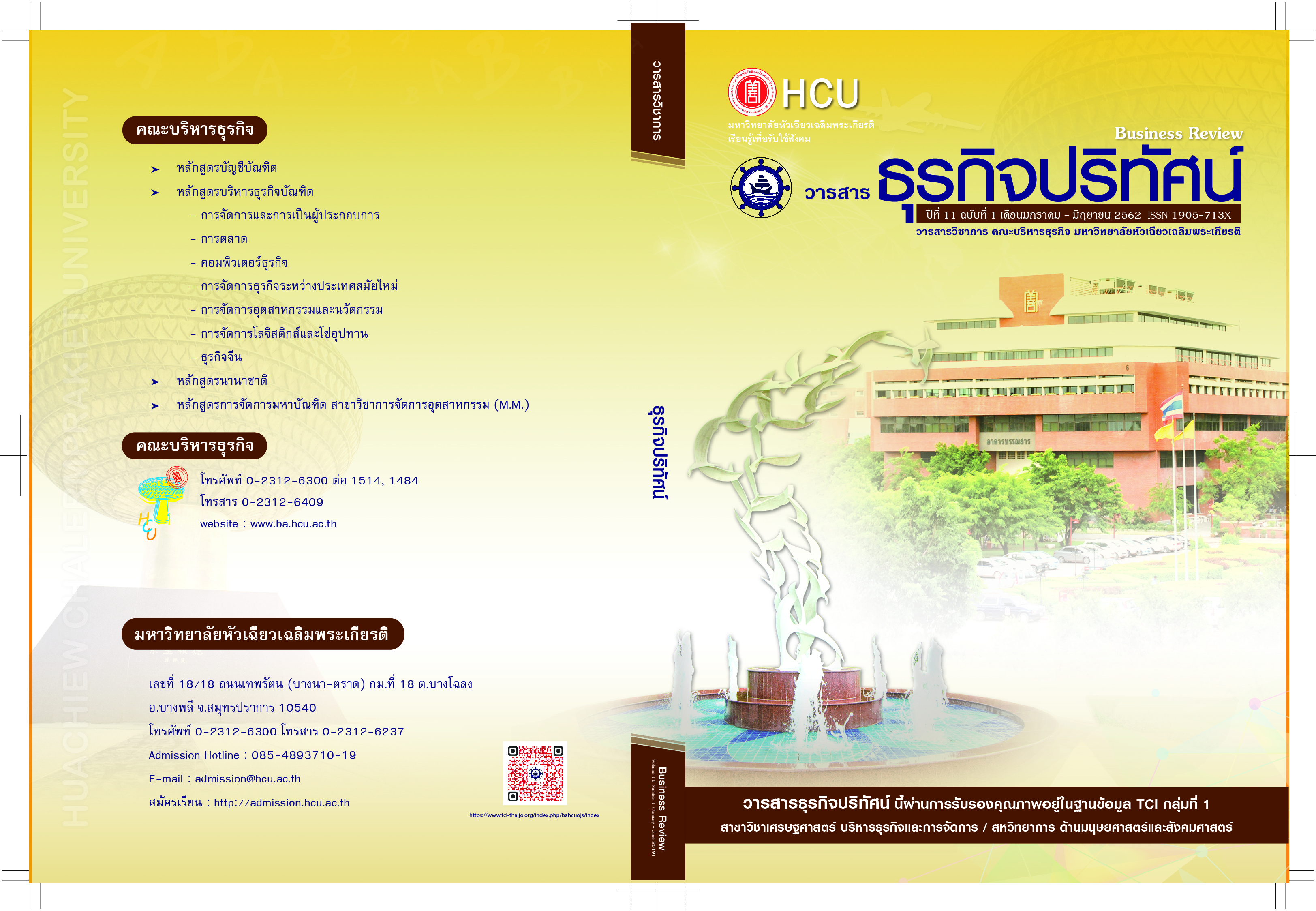Service Quality and Corporate Social Responsibility Affecting on Customer Satisfaction of Starbucks Coffee Shop at Central Plaza Phitsanulok
Keywords:
Service Quality, Corporate Social Responsibility, Customer Satisfaction, Coffee ShopAbstract
At present, the coffee shop is a business with a growth rate and able to generate revenue
for numerous entrepreneurs affects a more intense competition which entrepreneurs in the coffee
business have to adjust their marketing strategies to carry on with the dynamic situation. The purpose
of this research was; 1) to study the factors of service quality that affect the customers’ satisfaction
of Starbucks Coffee Shop at Central Plaza Phitsanulok and 2) to study corporate social responsibility
factors that affect customers’ satisfaction of Starbucks Coffee Shop at Central Plaza Phitsanulok. This
study was the quantitative research and questionnaires were constructed as a tool to measure the data
of the study. The data were collected from 400 consumers of Starbucks Coffee Shop at Central
Plaza Phitsanulok by convenience Sampling. The data was analyzed by percentage, mean, standard
deviation and multiple regression analysis. The results of the study found that service quality factors
which consisted of tangibility, assurance and empathy as well as corporate social responsibility
factors which included ethics, philanthropy, and environment were affected to customers’ satisfaction
at Central Plaza Phitsanulok with the significance level .05. As a result, the data from the study is
considered beneficial and can be used as a guideline in the development planning for businesses
marketing strategies as well as generating the customer satisfaction in the service and the ability in
the competitiveness of the business in the future.
References
ในธุรกิจการท่องเที่ยวแบบพ?ำนักระยะยาวในการท่องเที่ยวในประเทศไทย. วารสารธุรกิจปริทัศน์,
7(2), 151-167.
กัลยา วานิชย์บัญชา. (2550). การวิเคราะห์สถิติ: สถิติส?ำหรับบริหารและวิจัย. พิมพ์ครั้งที่ 10. กรุงเทพฯ:
โรงพิมพ์จุฬาลงกรณ์มหาวิทยาลัย.
กัลยา วานิชย์บัญชา. (2552). การวิเคราะห์ข้อมูลหลายตัวแปร. พิมพ์ครั้งที่ 3. กรุงเทพฯ: โรงพิมพ์บริษัท
ธรรมสาร จำกัด.
ชาคริต อ่องทุน และ ประสพชัย พสุนนท์. (2559).ปัจจัยการตลาดที่มีอิทธิพลต่อความพึงพอใจด้านเทคโนโลยี
ในการซื้อสินค้าและบริการผ่านเฟสบุ๊ค ของนักศึกษามหาวิทยาลัยเทคโนโลยีราชมงคลตะวันออก
วิทยาเขตจักรพงษภูวนารถ. วารสารธุรกิจปริทัศน์, 8(2), 21-33.
ทศพล ระมิงค์วงศ์. (2551). วัดศักยภาพ จากมุมมองของลูกค้า. สืบค้นเมื่อ 10 มกราคม 2558, เว็บไซด์
http://202.183.190.2/FTPiWebAdmin/knw_pworld/image_content/77/p55-59.pdf.
พรชัย ศักดานุวัฒน์วงศ์. (2060). การมุ่งรับผิดชอบของผู้น?ำก?ำกับความรับผิดชอบต่อสังคมขององค์กร.
วารสารธุรกิจปริทัศน์, 9(2),173-190.
วิษณุ ศศิธรวัน และเพ็ญจิรา คันธวงศ์. (2556). การศึกษาปัจจัยความสอดคล้องของภาพลักษณ์ของตนและ
ปัจจัยความสอดคล้องของหน้าที่การใช้งานที่มีอิทธิพลต่อทัศนคติของผู้บริโภคและทัศนคติของ
ผู้บริโภคที่ส่งผลต่อความตั้งใจในการกลับมาซื้อกาแฟซ?้ำ, ในการประชุมวิชาการระดับชาติ พลวัต
การศึกษาสร้างสรรค์เพื่ออนาคตที่ยั่งยืน, วันที่ 23 พฤษภาคม 2556 ณ อาคารนิเทศศาสตร์
คอมเพล็กซ์ ปองทิพย์ โอสถานุเคราะห์. ปทุมธานี: มหาวิทยาลัยกรุงเทพ.
ศูนย์วิจัยกสิกรไทย. (2561). ธุรกิจร้านกาแฟบริหารอย่างไรให้รุ่ง. สืบค้นเมื่อ 1 พฤศจิกายน 2561, เว็บไซด์:
https://kasikornbank.com/th/business/sme/KSMEKnowledge/article/KSMEAnalysis/Documents/
Coffee-Shop-Management.pdf
ศรชัย จาติกวณิช และ ประสิทธิ์ชัย วีระยุทธวิไล. (2551). พลังแห่งความส?ำเร็จ สตาร์บัคส์. พิมพ์ครั้งที่ 6.
กรุงเทพฯ: สำนักพิมพ์แมคกรอ-ฮิล.
สงกรานต์ จิรายุนนท์ และ สุมาส วงศ์สุนพรัตน์. (2557). คุณภาพการบริการ ความพึงพอใจของผู้บริโภค
และความภักดีต่อตราสินค้าของร้านกาแฟพรีเมี่ยมในประเทศไทย. วารสารวิทยบริการ
มหาวิทยาลัยสงขลานครินทร์, 25(2), 47-55.
สตาร์บัคส์ สาขาเซนทรัลพลาซ่าพิษณุโลก. (2561). รายงานผลประกอบการและค่าใช้จ่ายของร้านสตาร์บัคส์
สาขา,เซนทรัลพลาซ่าพิษณุโลก ประจ?ำปี 2561, พิษณุโลก.
สถาบันธุรกิจเพื่อสังคม. (2551). เข็มทิศธุรกิจเพื่อสังคม Corporate Social Responsibility Guidelines.
พิมพ์ครั้งที่ 1. กรุงเทพ: โรงพิมพ์ไอคอนพริ้นติ้ง.
Adeyemo, S. A., Oyebamiji, F. F., & Alimi, K. O. (2013). An Evaluation of Factors Influencing
Corporate Social Responsibility in Nigerian Manufacturing Companies. International Journal of
Academic Research in Economics and Management Sciences, 2(6), 54-63.
Arop, R. S., & Tantri, Y. R. S. (2018). How Service Quality Influence of Satisfaction and Trust Towards
Consumer Loyalty in Starbucks Coffee Indonesia. International Advanced Research
Journal in Science, Engineering and Technology, 5(10), 11-19.
Arikan, E., & Guner, S. (2013). The Impact of Corporate Social Responsibility, Service Quality and
Customer - Company Identification on Customers. Procedia Social and Behavioral, Sciences,
99(2013), 304–313.
Carroll, A. B. (1991). The pyramid of corporate social responsibility: Toward the moral management
of organizational stakeholders. Business Horizons, 34(4), 39–48.
Carroll, A.B.(1979). A three-dimensional conceptual model of corporate performance. Academy of
Management Review, 4(4), 497-505.
Chen, Z., Ling, K. C., Ying, G. X., & Meng, T. C. (2012). Antecedents of online customer satisfaction
in China. International Business Management, 6(2), 168-175.
Chao, H. L., & Hsien, B. W. (2014). Exploring The Relations between Service Quality and Consumer
Behaviors: A Case Study of 85°C Bakery Café from Taiwan. International Journal of
Organizational Innovation, 6(3), 31–41.
Deng, W. J., Yeh, M. L., & Sung, M. L. (2013). A Customer Satisfaction Index Model for
International Tourist Hotels: Integrating Consumption Emotions into The American
Customer Index. International Journal of Hospitality Management, 35, 133–140.
Fornell, C., Johnson, M. D., Anderson, E. W., Cha, J., & Bryant, B. E. (1996). The American
Customer Satisfaction Index: Nature, Purpose, and Findings. Journal of Marketing, 60, 7-18.
Galbreath, J. (2010) How does corporate social responsibility benefit firms? Evidence from Australia.
European Business Review,22 (4), 411-31.
Gruca, T. S., & Lopo, L. R. (2005). Customer Satisfaction, Cash Flow, and Shareholder Value.
Journal of Marketing, 69, 115-30
Hassan, Z., Nareeman, A., & Pauline, N. (2013) .Impact of CSR Practices on Customer Satisfaction
and Retention: An Empirical Study on Foreign MNCs in Malaysia. International Journal of
Accounting, and Business Management, 1(1), 63-81.
Hong, J. (2013). The Tourist Satisfaction Research of Service Quality of Cruise Ports: A Case of Wusongkou
Cruise Port in Shanghai. Business and Management Research. China, 2(4), 12-18.
Hazra, S.G., Kumar, T., & Piyush, P. (2013). Customer Loyalty in Indian Banking Sector: A Comparative
Study. International Journal of Management, 4, 236- 243.
Lovelock, C. H. (1996). Service Marketing. Upper Saddle River, New Jersey: Prentice-Hall
Entrepreneurship, Nova Southeastern University.
Likert, R. (1972). Likert Technique for Attitude Measurement. In W. S. Sahakian (Ed.), Social Psychology:
Experimentation, Theory, Research. Scranton, USA: Intext Educational Publishers.
Lin, C., & Lekhawipat, W. (2014). Factors Affecting Online Repurchase Intention. Industrial
Management & Data Systems, 114(4), 597-611.
Luu, T. T. (2012). Corporate Social Responsibility, Leadership, and Brand Equity in Healthcare
Service. Social Responsibility Journal, 8(3), 347-362.
Marinkovic, V., Senic, V., Kocic, M., & Sapic, S. (2013). Investigating The Impact of SERVQUAL
Dimensions on Customer Satisfaction: The Lessons Learnt from Serbian Travel Agencies.
International Journal of Tourism Research, 15(2), 184-196.
Oliver, R. L. (1980). A Cognitive Model of The Antecedents and Consequences of Satisfaction
Decisions. Journal of Marketing Research, 17, 460-469.
Parasuraman, A., Zeithaml, V. A., & Berry, L. L. (2013). A Conceptual Model of Service Quality
and Its Implications for Future Research. Journal of Marketing, 49, 41-50.
Panda, R. K., & Kondasani, R. K. R. (2014). Assessing Customers’ Perceived Service Quality in
Private Sector Banks in India. Serbian Journal of Management, 9, 91-103.
Sanit N. et al. (2016). Corporate Social Responsibility: Cause and Effect. Dusit Thani College Journal,
10(2), 304-320.
Shin, Y., & Thai, V. V. (2014). The Impact of Corporate Social Responsibility on Customer
Satisfaction, Relationship Maintenance and Loyalty in the ShippingIndustry. Corporate Social
Responsibility and Environmental Management, 22(6), 381–392.
Sornchai, H., & Yaowalak, P. (2010). Starbucks with Corporate Social Responsibility (CSR) “How
Starbucks Succeeds in a Business World with CSR”. Master Thesis, Karlstads Universitet.
Sutawidjaya, A. H., Tuti, W., & Suharyanti. (2012). The Influence of Service Quality on
Customer Satisfaction (Study in Starbucks Coffee - Indonesia). The 2012 International Conference
on Business and Management, 6 – 7 September 2012 (pp.264-282). Phuket: Thailand.
Yamane, T. (1973). Statistics: An Introductory Analysis. Third Edition. New York: Harper and Row
Publication.
Downloads
Published
How to Cite
Issue
Section
License
บทความที่ได้รับการตีพิมพ์เป็นลิขสิทธิ์ของวารสารธุรกิจปริทัศน์
ข้อความที่ปรากฏในบทความแต่ละเรื่องในวารสารวิชาการเล่มนี้เป็นความคิดเห็นส่วนตัวของผู้เขียนแต่ละท่านไม่เกี่ยวข้องกับมหาวิทยาลัยหัวเฉียวเฉลิมพระเกียรติ และคณาจารย์ท่านอื่น ๆ ในมหาวิทยาลัยฯ แต่อย่างใด ความรับผิดชอบองค์ประกอบทั้งหมดของบทความแต่ละเรื่องเป็นของผู้เขียนแต่ละท่าน หากมีความผิดพลาดใดๆ ผู้เขียนแต่ละท่านจะรับผิดชอบบทความของตนเองแต่ผู้เดียว





